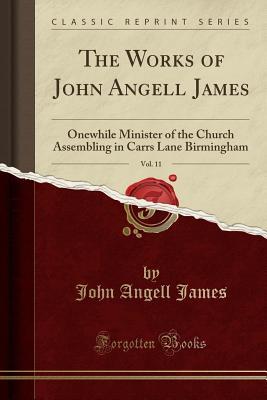- Bíblia
- Leia a Bíblia
- Versões da Bíblia
- Verso do dia
- Planos de Leitura
- Versos por Tópico
- Books of the Bible
- Imagens bíblicas
- Estude
- Comentários
- Concordâncias
- Dicionários
- Enciclopédias
- Sermões
- Bible Atlas & Maps
- BP Wiki
- Devocionais
- Devocionais de hoje
- Light of the World
- Todos os devocionais
- Inspirational Quotes
- Mais
- Picture Quotes
- Videos
- Inspirador
- Estudo da Bíblia
- O que a Bíblia diz
- Bible Q&As
- Daily Bread
- Bible by Genre
- Bible Stories
- Random Bible Verse
- Comunidade
- Store
The Works of John Angell James, Vol. 11: Onewhile Minister of the Church Assembling in Carrs Lane Birmingham
by John Angell James
Excerpt from The Works of John Angell James, Vol. 11: Onewhile Minister of the Church Assembling in Carrs Lane Birmingham
If "The Church Member's Guide" was one of the Author's earliest books, it was also the one in which he from time to time made additions and alterations of the greatest importance. The subjects of it were perpetually recurring to his mind with the deepest interest, as they related to the scenes and institutions amidst which he lived: for his life was spent in teaching men their duties, especially those relating to the self-government of the church of Christ. Finding no treatise on that subject sufficiently minute and practical, he offered this work to the churches of his order, and it immediately attained a widely-extended circulation in England and the United States.
The notice which it received from members of the Anglican Church, is stated in the Preface to the ninth edition, which was not reprinted after the publication of "Dissent and the Church of England," and will be found in the volume containing the Author's controversial pieces, with a further notice by the Editor.
This book was considered by many to exaggerate the extent and frequency in the Author's denomination of the evils which it points out, and his anxiety to remove those evils from the system which he supported as, in his view, most in accordance with the spirit and examples of the New Testament, may have given some foundation for this complaint: but whether this were so or not, the candour and the confidence in the churches which the whole book manifests, and the noble spirit with which it was received by them, may challenge a parallel in church history, and afford no slight evidence of the truth and influence of Congregational principles.
If "The Church Member's Guide" was one of the Author's earliest books, it was also the one in which he from time to time made additions and alterations of the greatest importance. The subjects of it were perpetually recurring to his mind with the deepest interest, as they related to the scenes and institutions amidst which he lived: for his life was spent in teaching men their duties, especially those relating to the self-government of the church of Christ. Finding no treatise on that subject sufficiently minute and practical, he offered this work to the churches of his order, and it immediately attained a widely-extended circulation in England and the United States.
The notice which it received from members of the Anglican Church, is stated in the Preface to the ninth edition, which was not reprinted after the publication of "Dissent and the Church of England," and will be found in the volume containing the Author's controversial pieces, with a further notice by the Editor.
This book was considered by many to exaggerate the extent and frequency in the Author's denomination of the evils which it points out, and his anxiety to remove those evils from the system which he supported as, in his view, most in accordance with the spirit and examples of the New Testament, may have given some foundation for this complaint: but whether this were so or not, the candour and the confidence in the churches which the whole book manifests, and the noble spirit with which it was received by them, may challenge a parallel in church history, and afford no slight evidence of the truth and influence of Congregational principles.
BUY NOW
Paperback, 508 pages
Published January 18th 2019 by Forgotten Books (first published September 27th 2015)
Se inscrever
© 2025 Bibleportal.com Todos os direitos reservados.

John Angell James was an English Nonconformist clergyman and writer, born at Blandford Forum. After seven years apprenticeship to a linen-draper in Poole, Dorset, he decided to become a preacher, and in 1802 he went to David Bogue's training institution at Gosport in Hampshire. A year and a half later, on a visit to Birmingham, his preaching was so highly esteemed by the congregation of Carrs Lane Independent chapel that they invited him to exercise his ministry amongst them; he settled there in 1805, and was ordained in May 1806. For several years his success as a preacher was comparatively small; but he became suddenly popular in about 1814, and began to attract large crowds. At the same time his religious writings, the best known of which are The Anxious Inquirer and An Earnest Ministry, acquired a wide circulation.
He was one of the founders of the Evangelical Alliance and of the Congregational Union of England and Wales. Municipal interests appealed strongly to him, and he was also for many years chairman of Spring Hill (afterwards Mansfield) College. He was also an ardent slavery abolitionist.
... Show more